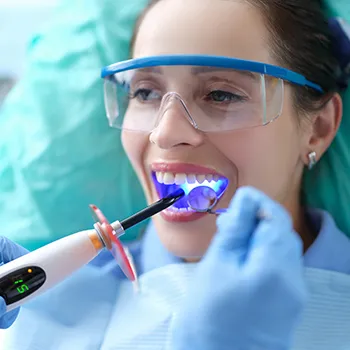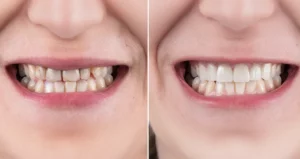Dental bonding and veneers are two of the best options in cosmetic dentistry today. Not only can they address misshapen teeth, they can also address minor gaps. But between dental bonding vs veneers, what can work the best for you?
Knowing the major differences between dental bonding and veneers can help you make an informed decision about which treatment can best meet your unique dental needs.
Find out everything you need to know about dental bonding vs veneers – their respective drawbacks, their advantages, and their suitability for various dental conditions and decide what works best for you.
What is Dental Bonding
Dental bonding is a cosmetic dental procedure that uses tooth-colored resin material to repair or improve the appearance of teeth.
Your dentist applies the resin directly to the tooth surface and hardens it with a special light, bonding the material to the tooth and improving its shape, size, color, or alignment.
Dental bonding addresses various cosmetic and functional issues, including:
- Chips
- Cracks
- Gaps Between Teeth
- Discoloration
- Exposed Tooth Roots
Pros of Dental Bonding
- Cost-Effective: Dental bonding is generally more affordable compared to veneers or crowns. This makes it a viable option for patients looking to enhance their smile without a substantial financial commitment.
- Quick Procedure: Bonding can usually be completed in a single dental visit, making it a convenient option for patients with busy schedules.
- Versatility: Dental bonding can address a variety of dental imperfections, including repairing chips, filling cracks, closing gaps between teeth, and covering discoloration.
- Natural Appearance: The resin used in bonding can be color-matched to blend seamlessly with the natural teeth, resulting in a smile that looks more natural.
Cons of Dental Bonding
- Durability: Dental bonding is not as durable as it can chip or wear down over time, especially in individuals who grind or clench their teeth (bruxism).
- Limited Lifespan: While dental bonding can last several years with proper care, it typically needs to be replaced or repaired more often compared to veneers or crowns, which have longer lifespans.

- Strength & Functionality: While bonding can effectively repair minor chips and cracks, it may not be suitable for restoring teeth with extensive damage or structural issues. In such cases, more durable restorations like crowns may be necessary for long-term functionality.
- Procedure Limitations: Dental bonding is best suited for minor cosmetic improvements and may not be suitable for all types of dental imperfections or severe cases of discoloration, chips, or gaps.
- Irreversibility: Although less invasive than some other procedures, bonding still requires the removal of a small amount of tooth enamel for proper adhesion of the bonding material. This process is irreversible and can potentially weaken the tooth structure over time.
What Are Veneers
Veneers are thin, custom-made shells made of porcelain or composite resin. They are bonded to the front surface of teeth to improve their appearance.
Veneers are designed to match the natural color, shape, and size of your teeth, enhancing aesthetics and providing a durable solution to various dental imperfections.
Veneers can address issues such as:
- Stains and discoloration
- Chipped or worn teeth
- Misshapen teeth
- Gaps between teeth
- Minor alignment issues
Pros of Veneers
- Natural Appearance: Veneers are custom-made to match the color, shape, and size of your natural teeth, providing a seamless and natural-looking smile.
- Durability: With good oral hygiene practices and regular dental check-ups, veneers can last 10-15 years or even longer.
- Versatility: Veneers can address a wide range of cosmetic dental issues, including severe discoloration that does not respond to whitening treatments, chipped or worn teeth, gaps between teeth, and minor alignment issues.
- Stain Resistance: Porcelain veneers are highly resistant to stains from coffee, tea, red wine, and tobacco products, maintaining their natural appearance over time.
- Improved Self-Confidence: Veneers can significantly enhance the appearance of your smile, boosting self-esteem and confidence in social and professional settings.
Cons of Veneers
- Irreversibility: The process of applying veneers involves removing a thin layer of enamel from the front surface of the teeth to accommodate the veneers. This irreversible step means that once you have veneers, you will always need them to maintain the appearance of your teeth.
- Cost: Veneers can be more expensive than other cosmetic dental treatments, such as dental bonding.
- Sensitivity: Some individuals may experience increased tooth sensitivity after the enamel has been removed and before the veneers are placed, which can be uncomfortable.
- Color Matching: While porcelain veneers are highly stain-resistant, their color cannot be altered once they are bonded to the teeth. This means any future teeth whitening procedures will not affect the color of the veneers, potentially leading to a mismatch with natural teeth over time.
Factors Influencing Your Choice
When deciding between dental bonding vs veneers, several factors must be considered to determine which is best for you.
Extent of Dental Issues
Dental bonding is typically suitable for minor chips, cracks, gaps, and discoloration that affect a few teeth. Veneers, on the other hand, may be more appropriate for addressing extensive discoloration, severe chipping, or misshapen teeth affecting multiple teeth.
Durability Requirements
Veneers are generally more durable and resistant to staining and wear compared to dental bonding. Dental bonding is better suited for those seeking a temporary solution or a stepping stone to veneers.
Cost Considerations
Dental bonding is generally more cost-effective than veneers, which can be significantly more expensive due to the materials and customization involved. On the other hand, while veneers may have a higher initial cost, they often provide greater longevity and may require fewer replacements over time compared to bonding.
Personal Health Factors
People who grind or clench their teeth may benefit from the durability of veneers over bonding material, which can be more susceptible to damage. The condition of your gums and overall oral health may influence the suitability of bonding or veneers for your specific case.
Dental Bonding vs Veneers – Deciding What Works Best for You
The decision between dental bonding vs veneers ultimately depends on what you find more suitable for your specific case.
Choose Dental Bonding If
- You want a cost-effective solution for your smile.
- You have minor cosmetic issues that need to be addressed.
- You want a quick solution that is minimally invasive.
Choose Dental Veneers If
- You wish to address significant aesthetic issues with your teeth.
- You wish to get a more lasting solution for your smile problems.
- You are looking for a dramatic transformation.
Takeaway
Ultimately, the decision between dental bonding vs veneers should consider factors such as the extent of dental issues, desired longevity and durability, aesthetic goals, and budget. Make sure to consult with a qualified dentist who can assess your dental situation and give you personalized recommendations.
Whether you opt for the immediate enhancements of dental bonding or the lasting beauty and resilience of veneers, both treatments can significantly enhance your smile and boost your confidence. By making an informed choice guided by professional advice, you can achieve the radiant smile you’ve always desired. Visit Tamarack Hills Family Dentistry Now.
Contact Tamarack Hills Family Dentistry to learn more.
FAQs
Which option is more affordable, dental bonding or veneers?
Generally, dental bonding is more affordable compared to veneers. The cost of bonding can vary based on the number of teeth treated and the complexity of the issues addressed. Veneers, while offering greater durability and aesthetic benefits, are more expensive due to the materials used and the customization required to match the natural teeth.
How long do dental bonding and veneers last?
Dental bonding typically lasts around 5-10 years with proper care. Veneers, especially those made of porcelain, are more durable and can last 10-15 years or even longer with good oral hygiene and regular dental check-ups.



